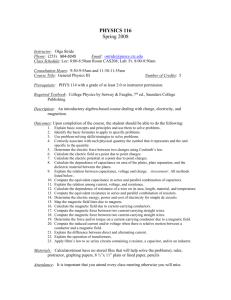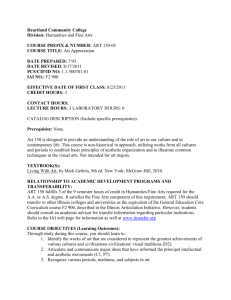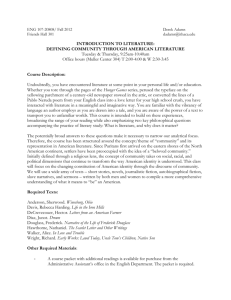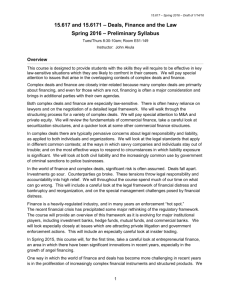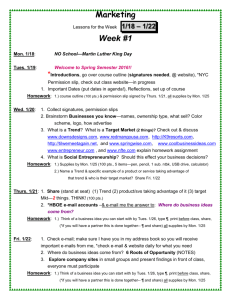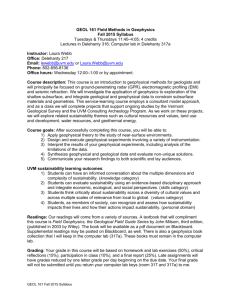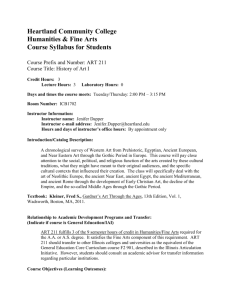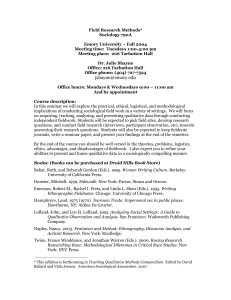religion perspective
advertisement
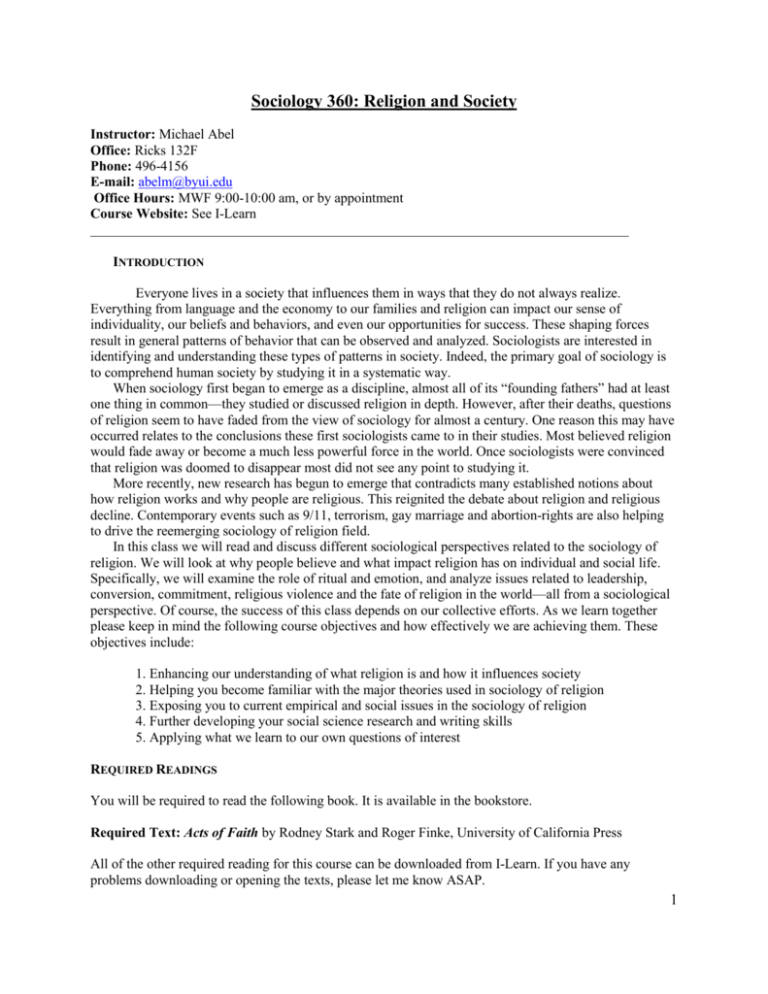
Sociology 360: Religion and Society Instructor: Michael Abel Office: Ricks 132F Phone: 496-4156 E-mail: abelm@byui.edu Office Hours: MWF 9:00-10:00 am, or by appointment Course Website: See I-Learn ______________________________________________________________________________ INTRODUCTION Everyone lives in a society that influences them in ways that they do not always realize. Everything from language and the economy to our families and religion can impact our sense of individuality, our beliefs and behaviors, and even our opportunities for success. These shaping forces result in general patterns of behavior that can be observed and analyzed. Sociologists are interested in identifying and understanding these types of patterns in society. Indeed, the primary goal of sociology is to comprehend human society by studying it in a systematic way. When sociology first began to emerge as a discipline, almost all of its “founding fathers” had at least one thing in common—they studied or discussed religion in depth. However, after their deaths, questions of religion seem to have faded from the view of sociology for almost a century. One reason this may have occurred relates to the conclusions these first sociologists came to in their studies. Most believed religion would fade away or become a much less powerful force in the world. Once sociologists were convinced that religion was doomed to disappear most did not see any point to studying it. More recently, new research has begun to emerge that contradicts many established notions about how religion works and why people are religious. This reignited the debate about religion and religious decline. Contemporary events such as 9/11, terrorism, gay marriage and abortion-rights are also helping to drive the reemerging sociology of religion field. In this class we will read and discuss different sociological perspectives related to the sociology of religion. We will look at why people believe and what impact religion has on individual and social life. Specifically, we will examine the role of ritual and emotion, and analyze issues related to leadership, conversion, commitment, religious violence and the fate of religion in the world—all from a sociological perspective. Of course, the success of this class depends on our collective efforts. As we learn together please keep in mind the following course objectives and how effectively we are achieving them. These objectives include: 1. Enhancing our understanding of what religion is and how it influences society 2. Helping you become familiar with the major theories used in sociology of religion 3. Exposing you to current empirical and social issues in the sociology of religion 4. Further developing your social science research and writing skills 5. Applying what we learn to our own questions of interest REQUIRED READINGS You will be required to read the following book. It is available in the bookstore. Required Text: Acts of Faith by Rodney Stark and Roger Finke, University of California Press All of the other required reading for this course can be downloaded from I-Learn. If you have any problems downloading or opening the texts, please let me know ASAP. 1 COURSE REQUIREMENTS Prepare Preparation Reports: Effective preparation is crucial to your learning in this class. Each day there is reading assigned in the Course Outline you are required to complete a Preparation Report (PR) on I-Learn BEFORE you come to class. In this report you will evaluate the extent of your preparation for that day by indicating whether or not you did the following: 1. In addition to reading and studying assigned texts, I looked up, read, and studied other materials that solidified my understanding of the principles and processes presented. 2. I took useful and detailed notes on everything I read and cited the sources I used next to the related notes (using ASA format). 3. Applying and citing (using ASA format) ideas from my reading and research, I wrote down several detailed and specific answers to the question on the syllabus. You are required to bring all of your preparation to class and from time to time I will have you turn in those materials. If your self-reported scores are inconsistent with your actual preparation, I will let you know and will change your PR score accordingly. Each Preparation Report is worth 3 points. Failure to submit a preparation report prior to class time will result in a 0 for that day. Teach One Another Participation: If you properly prepare, you will come to class with a good understanding of the principles we are learning. Consequently, class time can be focused on addressing specific areas of confusion and further developing our understanding of how and why religion works. During class we will most often be engaged in discussions and activities that require you to contemplate and further apply the information you are studying. Each participation activity will be worth 5 points and several of them will be graded. Part of the grade will be based on how effectively you apply your preparation materials, so make sure you always bring your preparation to class. Religion in the News: Principles of sociology become clearer when we can see how they relate to current events. During the semester each of you is required to find newspaper articles or watch news clips related to religion. You should seek out news from LEGITIMATE local, national and international news sources. I will pass around a sign-up sheet where you will select the day you want to present your article. On that day you will be expected to lead the class in a 5-10 minute discussion based on your article. You will be graded on the quality of the discussion you lead. This assignment is worth 5 points. Ponder and Prove Religion Case Study: Applying the directions given on the Religion Case Study Guidelines sheet, each of you will be expected to do a thorough analysis of one religious group of your choice. Essentially, you are expected to become an expert on that group. Throughout the semester you should present the insights you have about that religion as we discuss various issues. The paper will be due on Tuesday, June 15th and should be no longer than FIVE, double-spaced pages. Failure to turn in this assignment will result in a failing grade for the course. This assignment will be worth 50 points. 2 Create Your Own Religion: As part of a group, you will be expected to demonstrate what you have learned throughout the course by creating a unique religion and presenting it to the class. Using course materials, Acts of Faith, your creative minds, and other relevant resources you should create a religion that has characteristics that you have learned result in a successful religion. As explained in the Create Your Own Religion Project Guidelines, each group will be expected to write a 10-page paper describing the key aspects of their religion in detail and how each element serves to strengthen it. The paper is due on Tuesday, July 13th. This paper along with your presentation will be worth 25 points. Failure to participate in this project will result in a failing grade for the course. Group Grade: Each person in the class will be given the opportunity to evaluate the contributions of their fellow group members. Since I cannot know how much you participated in the group project, it seems only fair that those who do know have the power to determine your grade. Each member of your group will grade your contribution to the project on a scale of 0 to 5. The proportion of points out of 5 you are given by your group members is the same proportion of the final project grade you will earn. This should motivate you to be a good group member. Of course, I would hope you would work hard for your group simply because it’s the right thing to do. GENERAL POLICIES Decorum and Etiquette: Sociology addresses many complex issues about which people have widely varying insights. Views about religion can be especially strong. In my experience, people are rarely trying to offend others, even if they do sometimes. Because it is so important to hear all sides of an issue, we should always respect what others have to say and also be willing to share our own thoughts. Never assume that others in the class believe the same way you do. I expect each member of the class to try to understand the perspectives of others. Do not hesitate to simply think before you speak. Unless I say otherwise, NO LAPTOPS OR CELLPHONES should be on or in use during class time. Late Work and Make-ups: As a general rule, I believe it is unfair to students for me to accept late work. You all have a syllabus and know the due dates and format of the class. You must arrange your own schedules in a way that allows you to be in class every day and complete assignments on time. If you cannot do this, you should reconsider taking the course. Late Case Studies and Projects will be penalized 20% per day. If you fail to complete a Preparation Report, you receive a 0 on it. Students with disabilities: I will gladly provide accommodations for students with disabilities as recommended by the Disability Service Center. If you have any disability that may impair your ability to complete this course successfully, please contact the Disability Service Center (McKay 158, 496-1158). All services are coordinated with the student and the instructor by this office. They will provide you with important information about accommodations that may be available to you for this class. Cheating and Plagiarism: While all students, especially those at BYU-Idaho, know it is wrong to cheat and plagiarize, it still happens. There are specific skills students need to master in order to correctly cite sources, especially in this age of the internet. In addition to this, it can sometimes be difficult for students to deal with the stress and strain of college life without participating in unethical and immoral practices. Please let me or someone else know if you are feeling this kind of pressure so we can try to help. Each of you must read the Honor Code policies related to academic honesty, including how the university defines and punishes this kind of academic misconduct: http://www.byui.edu/studenthonor/academic%20honest.htm. Also, please review the examples of academic misconduct noted under the section “What is academic misconduct?” at the following website: http://depts.washington.edu/grading/issue1/honesty.htm#misconduct. 3 GRADING Your grade will be calculated by adding up all of your points and converting them into a percentage. The percentage will be rounded to the nearest whole number and can be interpreted as follows: (%) Grade Meaning 93-100 90-92 87-89 83-86 80-82 77-79 73-76 70-73 60-69 Lower than 60 A AB+ B BC+ C CD F Outstanding Understanding Considerable/Significant Understanding Sufficient Understanding Poor Performance and Initiative Failure in the Course COURSE OUTLINE AND READING ASSIGNMENTS Day Tues Date 04/20 Required Reading Syllabus and Cheating and Plagiarism Links Thurs 04/22 *Johnson 2006, “A Free-for-all on Science and Religion” *Cannon 2002, “Latter-day Saints and Science” PR#1 Due Tues PR#2 Due Thurs PR#3 Due Tues PR#4 Due Thurs PR#5 Due Tues PR#6 Due Thurs PR#7 Due What should be the relationship between science and religion? 04/27 You Find Your Own Assortment of Readings—Defining Religion 04/29 What makes something “religion”? *Miner 1956, “Body Ritual among the Nacirema” Why does religion seem irrational and crazy to many people? 05/04 05/06 *Marx and Engels 1846, Excerpts on ideology and morality Alma 32 How do Marx and Engels compare to and contrast with Alma 32? *Berger 1967, “Religion and World-Construction” Why do people believe and how is the content of their belief determined? 05/11 *Durkheim 1912, “Social Rituals and Sacred Objects” Why are different things sacred to different people? 05/13 You Find Your Own Assortment of Readings—Defining Ritual What makes something “ritual”? 4 Tues PR#8 Due Thurs PR#9 Due Tues Thurs 05/18 *Cladis’ 2001, Introduction to Durkheim (pg. vii-ix, xvi-xxiv) How do ritual and emotion interact in the context of religion? 05/20 *Weber 1914, “Legitimacy and the Types of Authority” 05/25 How do charisma and charismatic groups work? No Reading—Discussions of Religion Case Studies 05/27 PR#10 Due Tues 06/01 PR#11 Due Thurs 06/03 PR#12 Due Tues 06/08 Thurs 06/10 PR#13 Due Tues 06/15 Thurs 06/17 PR#14 Due Tues 06/22 PR#15 Due Thurs 06/24 PR#16 Due Bring Draft of First 5 Sections of Religion Case Study Stark and Finke 2000, Chapter 4, “The Micro Foundations of Religion” *Oaks 1984, “Why Do We Serve” What makes people committed to religion? *Weber 1905, Excerpts from The Protestant Ethic and the Spirit of Capitalism How and why does religion impact other societal institutions? Stark and Finke 2000, Chapter 5, “Conversion and Reaffiliation” Mosiah 27 Why do people switch religions? Why do they stay in a religion? No Reading—Discussions of Religion Case Studies Bring Complete Draft of Religion Case Study *Iannaccone 2006, “Market for Martyrs” Why is there religious violence? What about religion can lead to violence? No Reading—Discuss Create Your Own Religion Project Turn in Religion Case Study Paper *Berger 1967, “Secularization and the Problem of Plausibility” What is secularization and what causes it? Stark and Finke 2000, Chapter 3, “Secularization R.I.P.” Is secularization happening? Why or why not? *Feldman 2005, “A Church-State Solution” D&C 134 Mosiah 29 Tues 06/29 What should be the relationship between churches and states? No Reading—The Future of Religion Thurs 07/01 What would the world be like without religion? No Reading—Work on create your own religion project in class Tues 07/06 No Reading—Work on create your own religion project in class 5 Thurs 07/08 No Reading—Work on create your own religion project in class Tues 07/13 Group Presentations Thurs 07/15 Group Presentations Tues 07/20 Group Presentations Turn in Create Your Own Religion Paper *Can be found on I-Learn 6


